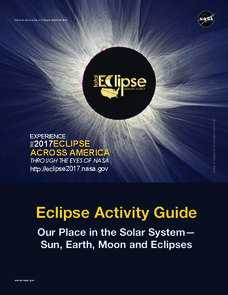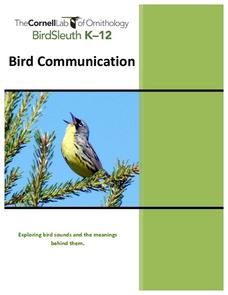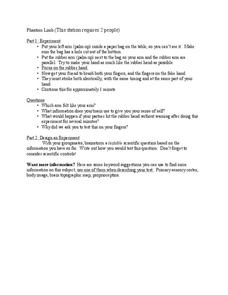American University
Factitious
Truth or factitious? Users of an engaging interactive test their ability to identify whether an article is real or fake news.
Roald Dahl
Matilda - Arithmetic
Mr. Wormwood, one of the characters in Roald Dahl's Matilda, is not the most trustworthy of characters. Have student groups take on the roles of car salespeople and play a game to see who can make the most profit by selling refurbished...
NASA
Eclipse Activity Guide
Ever made solar s'mores? Or recreated the solar system using peanuts? Astronomers young and old investigate all things solar using a variety of activities. Explore how the sun works, types of light it emits, and methods of charting the...
Space Science Institute
The "All American" Eclipse Guide
Are you ready for the biggest astronomical event of the year? More importantly ... are you ready to share it with your scholars? Use a presentation filled with facts and diagrams to make sure everyone in class understands the importance...
Library Sparks
Reference Tools Vocabulary Challenge
Learners love the opportunity of going to the library to jump into that one comfy chair in the whole room with a book, or be a lucky one to get to the computers before anyone else. But knowing how to locate books and other reference...
Channel Islands Film
Island Rotation: Lesson Plan 1
How do scientists provide evidence to support the theories they put forth? What clues do they put together to create these theories? After watching West of the West's documentary Island Rotation class members engage in a series of...
Big Kid Science
Create a Milk Carton Camera to Observe the Eclipse!
Step aside, fancy glasses... it's time to create a solar eclipse viewing camera of your own using nothing more than a milk carton.
Big Kid Science
Photographing the Eclipse Tips and Tricks Guide
Use a guide that provides safe ways for viewing the eclipse with a camera or telescope. The guide also includes tips and tricks for getting the best shot using a camera phone or SLR camera. You won't wanna miss this!
Big Kid Science
Create Dynamic Art Using the Eclipse!
What happens to light as it passes through a hole? This is the main question centered around the designing of a solar eclipse dynamic art piece that uses a solar eclipse and paper to create a pinhole projection of the art.
Channel Islands Film
Cache: Lesson Plan 2 - Grades 4-6
Class members will dig this activity that has them trying their hand at recovering artifacts. Groups are assigned a section of a sandbox, carefully uncover the artifacts in their section, and then develop theories about who might have...
University of Minnesota
Beautiful Brain: Do You See What I See?
Can art play tricks on your eyes, and can a still painting really appear to vibrate? The second lesson in a four-part series discusses the way our beautiful brains translate visual images. It highlights the style of optical art and...
Scholastic
STEM Challenges and Activity Sheets 3–5
How can engineers help their communities? Three challenges in the first unit explore why STEM is important to communities and how neighborhoods are engineered to experience those benefits. The second unit prompts groups to plan an...
Cornell University
Exploring Rocks and Minerals
Investigate the properties of rocks and minerals through a rockin' hands-on activity. Learners test rocks for various properties and, using a guide, attempt to identify different samples. They use various properties including hardness,...
Cornell Lab of Ornithology
Bird Communication
Sing for your dinner! Investigate the purpose of bird songs and strategies birds use to communicate. Through the lessons, individuals learn how to recognize different types of bird communication as well as hypothesize the purpose of...
Cornell University
Classification
Explore the scientific method of classification. An interactive activity asks learners to create a classification system for a group of objects and develop a flow chart to communicate their systems. In addition, individuals use a...
University of Southern California
Human Impact on the Sea
How far does the human hand reach? Five interactive lessons lead classes through a unit exploring the human impact on ocean resources, pollution, and even extinction. Learners discover how their decisions affect the ocean environment...
University of Southern California
How do Organisms Interact?
Examine how organisms interact through a hands-on experience. Learners study population dynamics and distribution during an informative five-lesson unit. The focus is on the ocean environment and the organisms within it.
University of Southern California
What Lives In The Ocean?
One of the most diverse environments on Earth is the ocean. Young scientists explore the living things found in the ocean during an exciting seven-lesson unit. Their study includes organisms from plankton to invertebrates and vertebrates...
University of Southern California
What Is The Ocean?
Go on a tour of the ocean through the lens of a scientist. Learners read maps of the ocean floor, study tide behavior, examine wave motion, and analyze components of soil. Each lesson incorporates a hands-on component.
University of Southern California
What's the Catch?
There must be a catch! A comprehensive lesson looks at ocean fishing concerns through a set of five hands-on activities. Learners become aware of the risks of seafood contamination and factors that have affected the ocean environment.
Cornell Lab of Ornithology
Investigating Evidence
Explore the scientific process through nature. Scholars become scientists as they develop a question, design an experiment, collect data, and analyze their results. A two-week lesson guides your classes through the process and provides...
University of Tennessee
Potential Energy
Did you know a tennis ball has potential? Collaborative groups analyze the potential energy of a tennis ball based on its height. They measure its starting height and the height after its first bounce. Using a graphical analysis, they...
Scholastic
Acceleration Nation Guide
Discover the science of NASCAR! Young scholars rev up their learning as they explore aerodynamic principles. Hands-on activities help learners understand concepts of friction, kinetic energy, and potential energy.
University of Minnesota
Phantom Limb
A phantom of neuroscience may leave pupils perplexed as they engage in an experimental lesson that recreates a phantom limb scenario. After experiencing the phenomenon, they choose a scientific question to explore further.

























